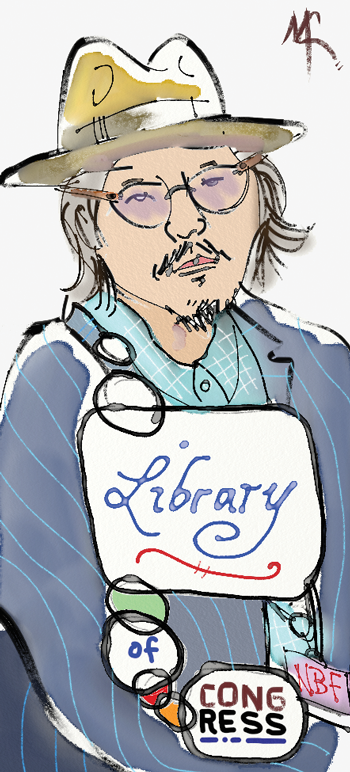Did you know that today is National Comic Book Day? To celebrate, we are sharing a contribution by Michael Cavna of the Washington Post to the September–October issue of LCM, the Library of Congress magazine. The entire issue, available here, showcases the Library’s collection of some 140,000 comic books. Cavna, an Eisner Award-nominated columnist and cartoonist, writes the “Comic Riffs” column for the Post.
Self-portrait by Michael Cavna for the Library of Congress, 2017. Used with permission.
She had come because of a comic book. She left stirred by the words of an American hero.
A young woman attended a comics-convention panel I moderated several years ago to listen in person to Rep. John Lewis, the civil-rights hero turned first-time graphic-novel memoirist.
Lewis had just published “March: Book One,” the first in an illustrated trilogy about how nonviolent protest was used to combat segregation in America. One of the graphic novel’s central messages, as illustrated by the 1965 Selma march, was about having the courage to stand up for one’s deepest convictions.
On this day, the woman came to the microphone and asked: “As a person in a same-sex relationship, should I move to D.C. so I can get married legally, or stay in Virginia and challenge the law?”
“You must fight!” Lewis exclaimed from the stage without a second’s hesitation. “You must stay. Stand up! Speak out! Speak up for what’s right!”
The room went silent, in awe of his resonant moral clarity. Then came the cheering. All because a comic book that speaks directly to American democratic ideals had been the source of inspired social connection.
America has contributed at least three unique inventions to the world’s culture: baseball, jazz and the newspaper comic strip. All three foster both the teamwork of shared production and the spark of an individual’s original genius. Yet to the reader, a comic panel is not only a window into the imagination of the creator, it is also a mirror that reveals something about ourselves.
Consider Ben Franklin, that father of American cartoon satire who sponsored such images as the iconic 1754 “Join, or Die” cartoon used in the Revolutionary cause. Think of cartoonist Thomas Nast, whose work toppled political corruption at Boss Tweed’s Tammany Hall.
Consider the social commentary of Richard F. Outcault’s Yellow Kid, establishing the funny pages as a national pastime. And then, with World War II on the horizon, the superhero comic-book boom was launched largely by Jewish creators who could identify with a cultural outsider like Superman.
“Peanuts,” Charles Schulz’s profound window into the adult psyche told through young archetypes. Art Spiegelman’s towering “Maus.” Will Eisner’s “A Contract With God.” Walt Kelly’s “Pogo.” Stan Lee and Jack Kirby’s creation of the Marvel Universe. Garry Trudeau’s satirical “Doonesbury,” spanning Nixon to Trump. Each of those creations is an essential link in our nation’s long comics evolution.
Which brings me full circle to Rep. Lewis. At the 2016 Library of Congress National Book Festival, I introduced Lewis, who had helped open the National Museum of African American History and Culture that very morning. And on that magical evening, Rep. Lewis used the platform of comics to speak in soaring oratory to the resilient promise of American equality.
The Library of Congress must continue its efforts to make the preservation and curation of graphic art a central mission. Because panel by panel, comics tell a story as profoundly as any other art form. They are a national treasure.

















